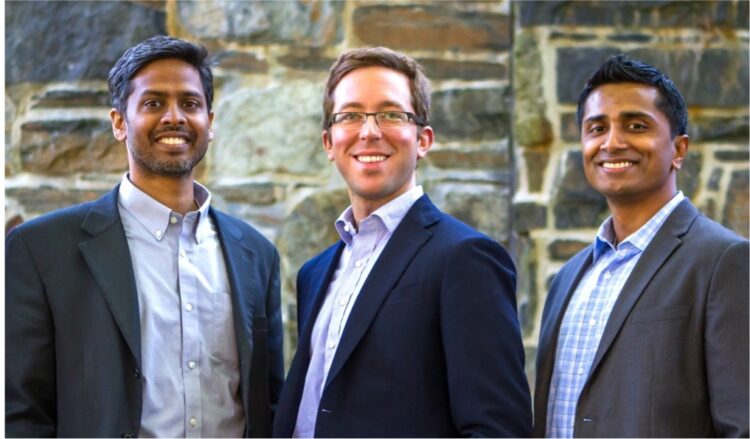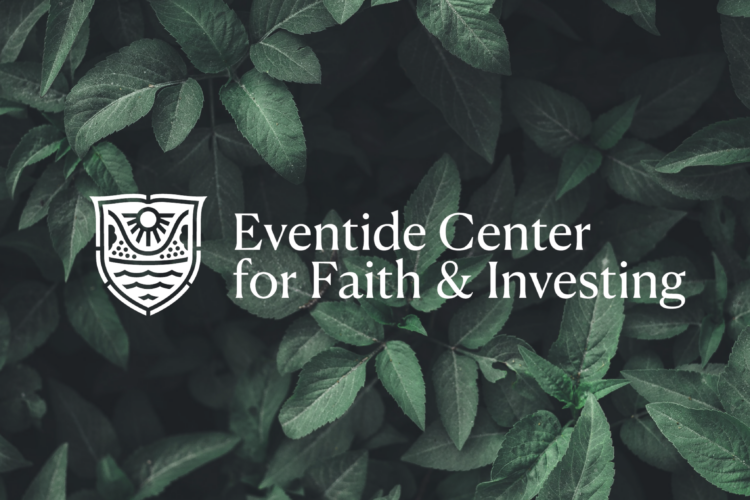Shaun Morgan: Welcome to the Invest By Design podcast. I’m Shaun Morgan, the Director of Education at Eventide. At Invest By Design, I use stories to pull back the curtain on how markets, industries, and economies work so that you can better understand the complicated world of investing. My hope is that as investing becomes less of a mystery, you’ll understand how important it is to be intentional about how you invest, not only for your own financial goals but for the well-being of others around you.
In this episode, I interview Robin John, one of the founders and the CEO of Eventide, the company producing this podcast. Eventide is an investment company that puts together mutual funds and other types of investment products that investors can invest in. But Eventide’s investment approach is somewhat unique. Robin and his co-founder, Finny Kuruvilla, are both Christians and wanted to know how their faith should influence how they invest. And their answer to this question might surprise you. Come to find out, their approach would be appealing to a lot of people who don’t share their same faith but have the same vision for what investing should be. Some people simply found it a smart way to invest. Robin’s story will help you understand some of the complicated inner workings of the investment industry and some of the opportunities it presents for you as an investor. On top of that, you’ll be inspired by the humble and unlikely beginnings of Eventide and its remarkable progress since its founding in 2008.
So take us back to the earliest foundations of Eventide. What started the original idea?
Robin John: Yeah, I think I met Finny in like 1996 timeframe, and he had just come to Boston to study at Harvard Medical School. I remember his mom told him to put away some of his stipend because he was, I think, receiving more than he needed. So I remember as a teenager, I was 16 at the time, just overhearing from Finny talking to my dad about how he wants to save and how he is looking at different mutual funds to invest into. But how as he looked at the holdings of these mutual funds, these were holdings that he just couldn’t align himself with. So looking back now at that, it’s very impressive to me because there’s like 150 million investor accounts in America. As I think through that, how many people are actually being that intentional and asking the question about, “Hey, what am I actually investing in?”
Shaun Morgan: There’s a good chance that you have shares in some kind of investment fund. It might be a mutual fund or an ETF, an Exchange Trade Fund. A lot of times retirement accounts like 401(k)s or 403(b)s are invested in what’s called a fund of funds. And these might have a name like Long-Term Growth Fund, or it might have a name that has a date that you plan on retiring. These are funds that simply invest in a lot of other funds. Since most of us don’t even pay attention to the names of the funds that we own, we don’t have any idea of how our money is being invested. We forget that these funds are investing in businesses all doing some level of good or bad in the world. So this question of what do I own or what are the companies that make up the mutual funds that I own really lies at the beginning of Eventide.
Robin John: I was really seeking more of a purpose in my life and just based on my own faith, wanting to align a lot of my convictions with the work that I’m doing. Because the work I do is pretty much my life. It is 50-60 hours of my week. So I was really wanting to align my values, my convictions, my faith with my work. So it was in 2007 that I asked Finny and my brother and then later Jason, the third founding member, to pray with me once a week. We started to pray together. So initially, the prayer was really about what I should do with my life. So it was really through that prayer and I think through the council of Finny and others that were around me that I got this vision that I could actually be in the business world and still, as our purpose statement says at Eventide, “Honor God.”
Shaun Morgan: So at this point, did you have any sort of investing background?
Robin John: Not really. Even when I was at BNY Mellon, I never participated in a 401(k) plan. So I didn’t have much of a background in investing. I knew what it was, but probably the real entry into investing for me was when we started talking about starting an investment firm together with Finny and myself. Finny said, “Okay, let’s maybe get some experience.” And we started an investment club. So it was just Finny, myself and my brother, put some money in an investment club for six months, started managing some money together. Prior to that, it was just Finny’s own money that he was managing in his own investment account.
Shaun Morgan: What did that look like? Did he just have an investment account? Was he just researching companies and choosing a handful of them to invest in?
Robin John: Yeah. So once a week, my brother, myself, Finny, and then Jason later started joining us too. We would have a company that we would research ourselves. Then we had to convince each other why that company belongs in the investment club portfolio. So we each put $10,000. So we had $30,000 in the investment club and we had six months of performance. That gave us some confidence to start Eventide. It sounds ridiculous, but I think we were praying and naive and just seeing a problem in the market.
We just saw how everybody was investing their money, and most conscientious values driven people, Christians, people of faith were investing in ways that we just saw didn’t align with their values, with their convictions, with their faith. So we just said, “You know what? We don’t have a lot of experience. We have a conviction. There’s a need in the marketplace that we think we could fill, that we could try to be a solution for.” So a leap of faith, we just really believed that we could serve a need here. So we started Eventide.
Shaun Morgan: So what was the first step in turning your investment club into Eventide where now you’re allowing other people to invest in this portfolio that you’re creating?
Robin John: So for us, we were just very much, I would say, optimistic and believing that conscientious people of faith would want to partner with us. We were trying to look at the different ways to do this. So obviously in the investment world, you don’t just start a mutual fund. People generally start managing separate accounts first before you build a track record and then launch a mutual fund. But for us, the few people that were in that conversation early, we looked around us and said, “You know what? We don’t know really anybody with money.” So for us to start a separate account, whose money are we going to manage? There isn’t really anybody that could give us even a hundred thousand dollars to manage. So we said, “You know what? We’re just going to jump into the mutual fund industry.” Because with the mutual fund, you could take dollars. Our account minimum was a thousand dollars, and if somebody did an automatic investment plan, it was a hundred dollars. We said, “You know what? We could market a mutual fund more openly and just go out to the marketplace and talk about this.”
We kind of did something that most people don’t do. We jumped into a mutual fund without having a track record, so without having a separate contract record or a model delivered separate account track record. We just jumped into a mutual fund business.
Shaun Morgan: In 2008, Robin and Finny launched Eventide and had one mutual fund that people could invest in. Their main differentiator as investors was going to be that they had certain industries that they would avoid investing in, what’s known as negative screens. But simply not investing in certain companies isn’t a complete investment strategy. And right before they launched, something incredible happened and it changed the trajectory of Eventide forever.
You started with just negative screens saying, “Well, we want to avoid businesses that are at least causing harm to people. We don’t want to profit off of that.” So how did you develop your positive look of the types of companies you did want to invest in?
Robin John: So even on the negatives, we really wanted to be thoughtful. So generally in the marketplace, you don’t see asset managers that screen for something like abortion also screening for something like weaponry or environment. But we said, “You know what? For us, we want to be holistically minded and really be thoughtful when it comes to these exclusionary screens, what we don’t invest in.” And we said, “You know what? We’re going to offend people. That’s okay.” At the end of the day, we want to build portfolios that we’re proud to be partnering with. But on June 13th, a man named Tim Weinhold showed up into our lives. So Finny and myself and my brother had started a house church in Cambridge, and it was meeting in Finny’s house. So Tim Googled house churches in Cambridge, Massachusetts. He had never been to a house church in his life. Somehow shows up at our house church. So now he’s in the house church.
And he overhears someone say that Robin and Finny are starting a Christian mutual fund. We don’t use that language anymore. But Tim came to us and said, “I know what it means to be Christian. I know what a mutual fund is. Put that together for me.” And we said, “We’re going to avoid ill gone gain.” And Tim said, “Well, that’s great. We should avoid ill gotten gain. But if you are allocating capital and if you’re trying to honor God, where should Christians allocate capital? Where should values driven people allocate capital?” I think that is the most important question that has ever been asked in the history of Eventide. And that got us to really think through the question about what is investing? It is the allocation of capital, so where should we be allocating capital?
Shaun Morgan: So whenever he asked that question, what’d you do next?
Robin John: Tim became very involved in that conversation with us. And then Jason was slowly getting involved as well. So Jason became the third founding member of Eventide. And Jason, he and Tim really started studying the Bible together and spending a lot of time with Finny and myself as well. We just said to ourselves, “If we’re seeking to honor God, the greatest commandment in the Bible is to love God and to love your neighbor as yourself. So how can we love neighbor? How can we honor God?” And that is how we came to the Business 360® framework. We identified the six neighbors to a business. We said, “Okay, if you’re investing capital and if investing is the allocation of capital into companies, what are the types of companies we should be allocating capital to?” We said, “Okay, let’s try to find the companies that are loving their neighbors best.” So we asked ourselves then, “Who are the neighbors to a business?” And we finally came to the conclusion that the neighbors are customers, employees, supply chains, host communities, environment and society, and we want to be investing in companies that are loving these neighbors well.
Shaun Morgan: So how did you find investors in the first couple of years? You didn’t have any kind of track record. You had a doctor that decided to start a mutual fund along with a guy that had lost his job and was looking for something to do. Who trusted you with their money? How did you find investors?
Robin John: We thought people would trust us, and most people didn’t trust us. So if you look at our early business plan, it was actually pretty ridiculous. So our distribution strategy was to go to churches Saturday mornings and buy donuts. We just assumed that pastors would let us through the door and that we could just speak from the Bible and that people would get convicted, that they need to align their values. But ultimately that was not a good strategy at all. People ultimately want to see a track record, and people wanted to see that this isn’t just Finny and Robin’s conviction, but that there’s real evidence that this leads to better investing for the long term. For us, the first couple of years were definitely a struggle. In the first year, we barely got $1 million under management.
Shaun Morgan: So you had $1 million of other people’s money that you were investing.
Robin John: Other people’s money. Mostly friends and family. Second year we got to 3 million. Third year, we got to 6 million. So in 2010, I believe is when our first financial advisor took a gamble on us. A person named Rick Lehman. And Rick was very convicted that what we were doing was the right thing to do. So he started talking to his clients.
Shaun Morgan: So Rick is your first financial advisor that gives you a chance. And the way the financial advisors work is they’re actually entrusted with other people’s money. Financial advisors have clients, and Rick is deciding to invest in Eventide for his clients. Now, did this spark confidence in other financial advisors that they’re able to do the same thing?
Robin John: A little bit. For the most part, you need a three year track record and then a five year track record. It’s a chicken and egg problem, and it’s very difficult to even get onto platforms that these financial advisors have their clients’ money custodied at. So if you don’t have a three year or a five year track record, if you’re not on the platform, the financial advisor can’t even bring your product to their clients. So at our five year mark, the New York Times and the Wall Street Journal wrote articles about us that over that five year period, our fund, at that time, our flagship fund was the best performing fund over that five year period.1 That really helped us. We grew from 75 million to 1 billion in one year in assets under management, and then 2.2 billion the next year. Just having that track record really opened the doors for financial advisors for platforms, and that’s really what catapulted our growth from that point on.
Shaun Morgan: As Eventide gained more credibility with a wider audience, people began to ask, what it was that made Eventide’s approach so unique? When people think of an investment firm whose founders wanted to honor God with their investments, they wonder what that looks like. Is it only for Christians? This is what makes Eventide so interesting. Robin believes that business and investing both have what he calls intrinsic value, meaning that their very function is important. Businesses have the important function of creating value by bringing something of worth or usefulness into existence. And one of the best ways to honor God and love your neighbor through your business is to be good at what you do.
One step further, Robin also explains that his faith inspires him to see every person as being made in the image of God, and therefore, everyone should be treated with dignity and respect. In businesses that treat people with dignity and respect, whether that be their customers, their employees, or their suppliers, these businesses might just have a competitive advantage over their peers, and this is what’s attractive to people regardless of their faith background. Robin explains that the same is true for investing, and he makes a point to remember what the purpose of investing is because he believes it’s how God designed investing to work, and therefore that it gives him a distinct edge in how he invests.
So tell me about the intrinsic value of investing. What power does it have to accomplish the purposes that you’re wanting to accomplish?
Robin John: Yeah, Shaun, when I was starting eventide with Finny, one of the biggest issues I saw in the investment world is that people didn’t even understand what investing is. I think that is still a major problem that we need to just bring education to the broad market. I think that the number is that 150 million investment accounts exist in this country, but I don’t think most of those people have really thought through the purpose of business or of investing.2 I was actually recently speaking to a professional money manager, and that person couldn’t explain to me what the purpose of investing is. But a couple of weeks ago, I was speaking to a class of undergraduate students and I asked them, “What is the purpose of investing?” And they said, “To allocate capital.” And I said to them, “Where would you want to allocate capital?” And they started giving me examples of where they would want to allocate capital.
So one of the things I often remind people is that we also root for the success of the companies we’re investing in. So it’s not just about avoiding ill gone gain, but really what do you want to see in the world? Those are the areas we should be putting our capital. So if you are investing in tobacco, an investor’s happiest, if everybody in the world smoked tobacco, you want more and more people to be customers in tobacco companies. Vice versa, if you are investing in a cancer drug, you want everybody with cancer to have access to that drug. What are we rooting for in the world? So most investors haven’t really thought through the purpose of investing or the power of investing to change the world, to have an impact.
So for me, the first thing that I wanted to do when we were starting Eventide was just to bring that education to the marketplace. But then the second component is to make it easy for people to invest in ways that align with their values. This is still a work in progress. I think we’re in many ways in the early stages of bringing that education and then bringing also the mechanisms to making this easy. We launched a mutual fund company initially, and the reason we launched a mutual fund company is because the mutual fund is the vehicle type, the product type that most people understood at that time. Now, ETFs are also growing. Of course, people with more money have separate accounts that their money managers do for them, but for the most part, the average investor in 2008 was investing in mutual funds. We wanted to reach the average person with just a thousand dollars of investments. We wanted to be available to them as well as to the person with millions of dollars. And the mutual fund was the vehicle for accomplishing that for us.
Shaun Morgan: For Robin and Eventide, there’s a real optimism about business and investing, a sense of possibility that when capital is properly directed, it can help us build a world that we want to live in, and the businesses that we invest in can help address some of the most important needs for our neighbors next door and across the world.
Robin John: Well, the investor should first be asking, is this product, is this service good for the world? Is this something that I would rejoice in if this thing is growing in the world? The investor holds a lot of power to allocate their capital for good purposes or for bad purposes. That’s the first way that investors have power and impact. But then when you think about investors coming to together through a pooled investment vehicle like a mutual fund, or it could be an ETF or a hedge fund, imagine the power of collective capital. So yes, each and every investor has capital, but when we are pooling that capital together, we have even more impact. Hopefully, we could partner together, not just Eventide, but other investment firms and really have that impact in the world.
Shaun Morgan: Robin mentioned that most of us in the US are invested in the stock market through some sort of investment vehicle, but we have no idea how our money is being invested or even who is investing it. And if our collected investments play a crucial role in building the physical world that we live in, shouldn’t we be more concerned about what kind of world we’re building? Eventide is on a mission to help investors remember the purpose of investing, and hopefully as a result, we’ll want to allocate capital towards the businesses we want to see grow. The Invest By Design podcast, since it’s produced by Eventide, is a part of that mission. When you listen to the episodes, my goal is to help you better understand investing in the stock market. So you’ll learn about how the stock market works, how different industries function, and I’ll teach you about some of the other powerful factors that impact investing. I want you to become a more informed investor so that you can be more intentional about how you invest or who you entrust to invest on your behalf.



















